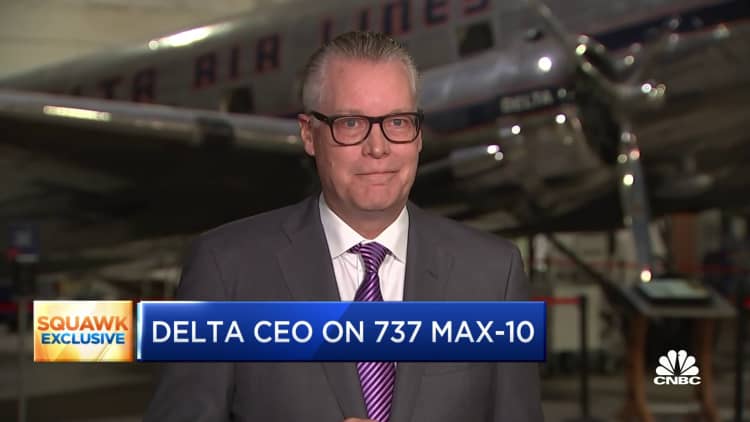https://news.google.com/__i/rss/rd/articles/CBMiSGh0dHBzOi8vd3d3LmNuYmMuY29tLzIwMjIvMTAvMTMvZGVsdGEtYWlyLWxpbmVzLWRhbC1lYXJuaW5ncy0zcS0yMi0uaHRtbNIBAA?oc=5
A Delta Airlines Airbus A-350 aircraft, flight number DL40 bound for Los Angeles takes off from Kingsford Smith International Airport on July 26, 2021 in Sydney, Australia.
James D. Morgan | Getty Images
Delta Air Lines expects to post another profit in the last quarter of the year and said both leisure and business travel continue to recover.
The carrier on Thursday said it expects earnings per share of $1 to $1.25 in the fourth quarter, with revenue topping the same period of 2019 by 5% to 9%, a sign higher airfares will stay firm.
Delta shares were up more than 3% in morning trading, while a higher-than-expected U.S. inflation reading weighed on the broader market.
For the third quarter, Delta reported net income of $695 million, or $1.08 per share, down from a $1.5 billion profit three years earlier, on record revenue of close to $14 billion, the results of a surge in summer travel with high fares to match. Adjusting for one-time items, Delta posted earnings per share of $1.51, while adjusted revenue came in at $12.8 billion, 3% above 2019 levels, despite a smaller schedule.
“The travel recovery continues as consumer spend shifts to experiences and demand improves in corporate and international,” CEO Ed Bastian said in an earnings release.
Here’s how Delta performed in the third quarter, compared with Wall Street expectations based on Refinitiv consensus estimates:
- Adjusted earnings per share: $1.51 versus $1.53 expected.
- Adjusted revenue: $12.84 billion versus $12.87 billion expected.
The Atlanta-based airline is the first U.S. carrier to report third-quarter results, and its upbeat forecast comes as clouds form over other industries, like some retailers. American Airlines, which reports its quarterly results next week, raised its third-quarter revenue forecast on Tuesday, while United Airlines is planning another big trans-Atlantic expansion for 2023, a bet international travel will continue to rebound.
The start of Delta’s peak spring and summer travel season was rocky, as disruptions prompted the airline and some of its rivals to trim summer flights to avoid more problems for travelers. Delta said that its capacity would be as much as 92% restored to 2019 levels in the fourth quarter and that it’s working toward a full recovery by next summer.
Delta and other airlines have been grappling with a surge in costs from labor to fuel. Delta’s fuel bill for the third quarter rose nearly 48% from 2019 to $3.32 billion.
Even stripping out fuel, costs per available seat mile were up close to 23% from 2019 in the last quarter, partly increased because Delta didn’t fly as much.
Bastian told CNBC’s “Squawk Box” on Thursday that the airline is close to its staffing needs and has hired about 20,000 people since the start of 2021, after a similar number took buyouts at the company’s urging during the coronavirus pandemic‘s travel slump. He said the airline is now focused on training staff.
International travel, largely sidelined in 2020 and 2021, was a bright spot in the third quarter, with unit revenue growth outpacing domestic for the first time since the pandemic started, Delta said, calling out Italy, Spain and Greece as popular destinations.
Executives at Delta and United have recently said European travel has been resilient this fall.
The airline said business bookings were 80% recovered to pre-pandemic levels at the end of the quarter and that recent surveys show 90% of corporate accounts indicating that they will maintain or increase travel in the fourth quarter compared with the third.
The carrier said Hurricane Ian, which ripped through Florida last month, cost it $35 million in revenue and had a 3-cent impact on adjusted per-share earnings.
Delta will hold a 10 a.m. ET call to discuss results.
Correction: Delta said its capacity would be as much as 92% restored to 2019 levels in the fourth quarter. An earlier version misstated the timing of the statement.





















